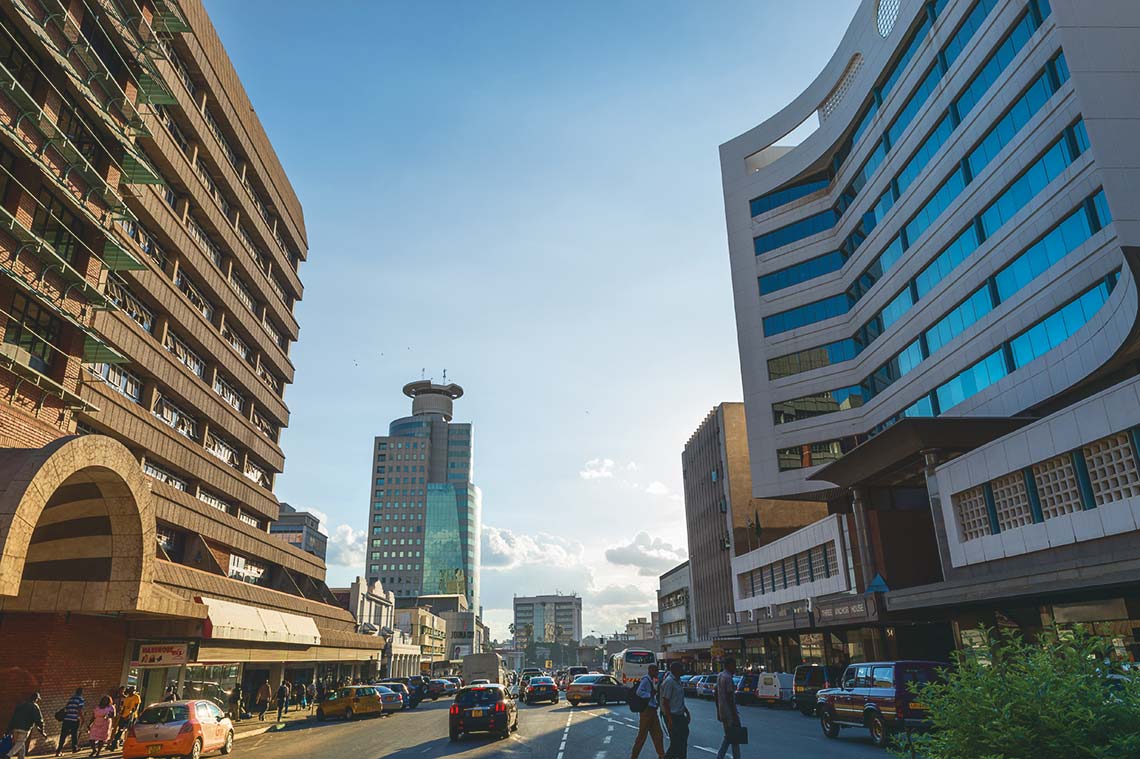Marktonderzoek in Zimbabwe, Afrika

The Republic of Zimbabwe, formerly Rhodesia, offers some of the most breathtaking landscapes in Southern Africa. It is a landlocked territory sandwiched between the Limpopo and Zambezi rivers. Its total land area is over 150,000 square miles.
The country borders Mozambique to the east and South Africa to the south. Zambia and Botswana are to the north and west. After years of civil and military unrest, Zimbabwe began to settle down around 1980. Yet, although it had a more stable form of government, it still faced hardships. For example, its struggle with hyperinflation is well-known.
Even now, electricity flickers on for only a few hours at a time, often at night. Another challenge is running water, which flows for only a few hours a week. It’s a difficult climate to run a business. In fact, business owners have to import power from Mozambique and South Africa. Still, it provides an opportunity for investors. These investors can look at providing essential services, ensuring the survival of businesses.
Trends
About 75 percent of the population depends on agriculture for its existence. Of note are its high literacy rate and progressive, well-educated workforce. These indicators are positive signs for investors to form strategic alliances. The services, manufacturing, telecommunications, and agricultural industries are excellent places to start.
The current world recession and COVID-19 have affected living conditions and employment. Still, the economic outlook is positive. Zimbabwe continues to enjoy a strong economy. It also has no significant dependence on funding from international agencies. Furthermore, experts are predicting a rise in GDP fueled by agriculture.
Belangrijkste industrieën
Zimbabwe occupies about 93 percent of the land area and 83 percent of water in Southern Africa. It is rich in natural resources, good infrastructure, and air and sea access. It also has reliable road networks.
Zimbabwe is among the world’s top 15 most prominent producers of gold. Zimbabweans also mine platinum, copper, coal, tin, metallic and non-metallic ores, nickel, chemicals, cement, wood products, steel, and fertilizers. Other exports are food products, clothing, footwear, and beverages.
Significant business opportunities exist in horticulture, tourism, engineering, forestry, manufacturing, mining, and telecommunications. Additionally, its main exports include gold, tobacco, sugar, cotton, and metal ores. Zimbabwe’s main export partners are:
- Frankrijk
- The Netherlands
- Zuid-Afrika
- Verenigd Koninkrijk
- Ireland
- Belgium
Consumentenbasis
Zimbabwe’s primary imports include fuels, mineral fertilizers, petroleum, transportation equipment, machinery, electrical energy, rice, wheat, and other foodstuffs.
Most of the population depends on agriculture. Thus, there’s significant potential to expand the sector. As a matter of fact, investors can make inroads in agro-processing, horticulture, and livestock. They can also explore a wide variety of fruit crops. For example, investors can grow peaches, strawberries, mange tout, nectarines. Another investment opportunity lies in value chain enhancement.
Zimbabwe has a diverse demographic. Although the Black population is predominant, the country is home to whites and Asians. In addition, it has quite a few other ethnic groups.
Zimbabweans are poor, and the government blames a recent drought for its food shortages. The country has over 15 million people, one-third of whom are between ages 15 and 29. Another third is under age 15.
Reasons to Grow Your Business in Zimbabwe
Zimbabwe has had many years of economic setbacks and domestic unrest. Still, it can now take the world by storm. It now has a stable government. It also has a favorable climate and excellent agricultural and mining prospects. All these factors make it ideal for investment. The country is mineral-rich with over 40 different mineral ores. Their mining industry contributes the most to the country’s annual GDP.
The industrial sector accounts for more than 25 percent of GDP. In addition, agriculture is around one-fifth of GDP. Farmers produce coffee, tobacco, wheat, peanuts, corn, and various fruits.
The high-quality soil, warm climate, and arable lands create the ideal conditions. Several industries can thrive, including forestry, irrigation, infrastructure, and mining. The manufacturing industry offers significant investment in pulp and paper production, plastics, tubes, tires, and vehicle assembly.
Zimbabwe’s tropical climate is ideal for agriculture. Opportunities include producing fresh-cut flowers, fruits, sugar and snap beans, and peas.
Further, it’s making positive strides in developing its tourism product. It aims to be one of the world’s most desirable destinations.
Overall, Zimbabwe has a well-established and reliable telecommunications network. It’s ideal for business engagement. Moreover, there are several opportunities to further enhance the already thriving banking sector.
About Market Research in Zimbabwe
Are you seeking investment opportunities in Zimbabwe? Our Qualitative, Quantitative, and Strategy Research methodologies provide several critical indicators. Our services foster business growth and development. Here we’ve provided a detailed analysis of several exciting business prospects. Zimbabwe holds much promise, and we hope that this article helps with your decision.


